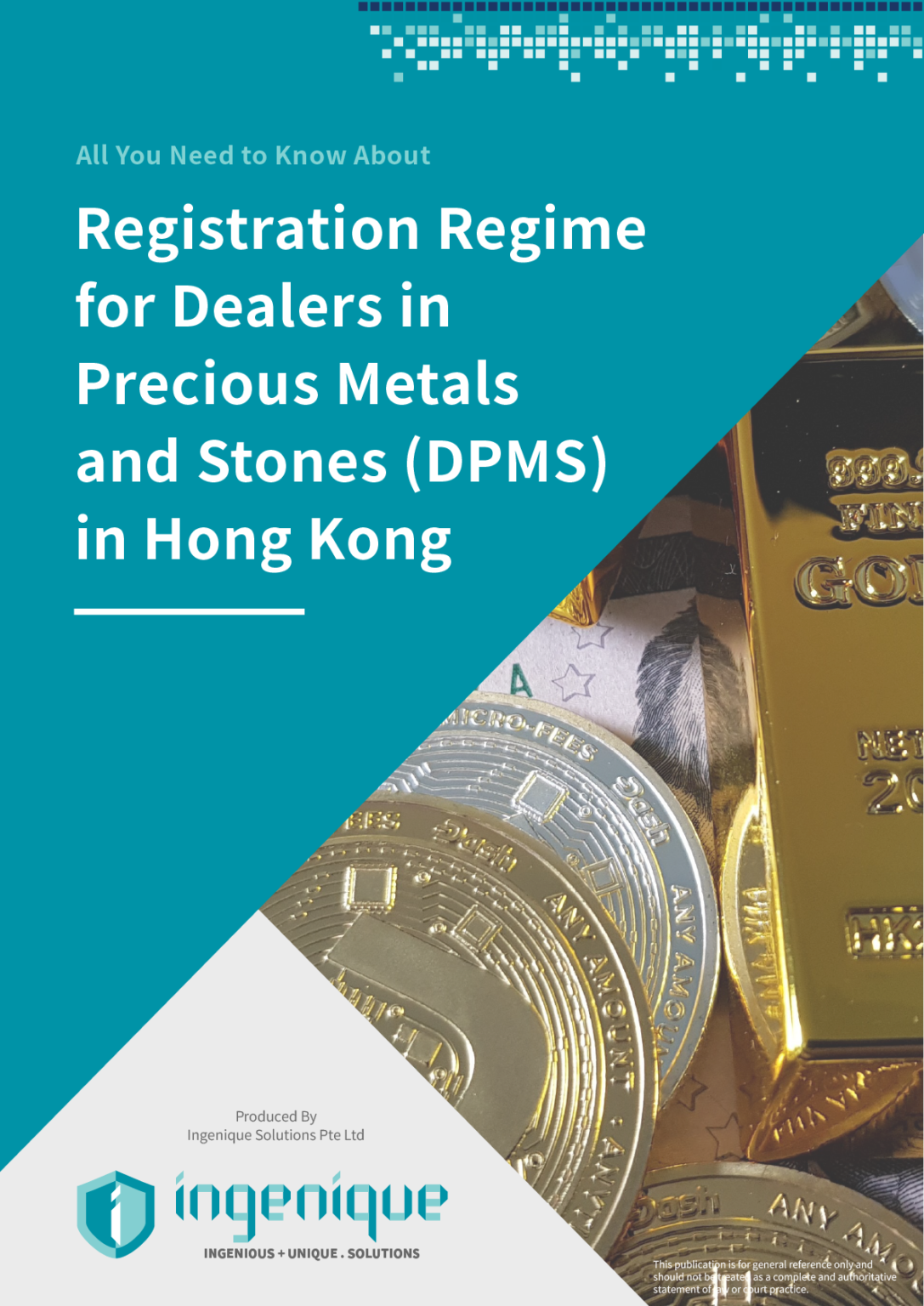updated on 30/01/2024

On 7 December 2022, Anti-Money Laundering and Counter-Terrorist Financing (Amendment) Bill 2022 in Hong Kong was passed by the Legislative Council, to introduce a registration regime for Dealers in Precious Metals and Stones (DPMS), so as to impose statutory anti-money laundering and counter-terrorist financing (AML/CTF) obligations on DPMS sector.
Following the imposition of AML/CTF regulations on Financial Institutions and Certain Designated Non-Financial Businesses and Professions (DNFBPs) under the Anti-Money Laundering and Counter-Terrorist Financing Ordinance (Cap. 615) (AMLO) in 2018, the Government propose a new two-tier registration regime under the AMLO for DPMS, which is one of the categories of DNFBPs defined by the Financial Action Task Force (FATF) for AML/CTF regulation, and will be regulated by the Commissioner for Customs and Excise (C of C&E). The Amended Ordinance concerning the Registration Regime for Dealers in Precious Metals and Stones (DPMS) came into effect on 1 April 2023.
Related Articles:
- Guide for HK DPMS: Registration Process, How to Do AML and Useful AML Tools (With Tips on Waiver of Registration Fee)
- SentroWeb — The Best AML Software For Hong Kong DPMS
- Virtual Asset Services Providers (VASP) Licensing Regime in Hong Kong proposed under the same Amendment Bill
 |
Download Free WhitepaperAll you need to know about: |
Definition/ Meaning of Dealers in Precious Metals and Stones (DPMS) Regulated Activity in Hong Kong
Under the Ordinance, Dealers in Precious Metals and Stones (DPMS) is defined as the person carries on any of the following activities by way of business
- trading in, importing or exporting precious metals, precious stones or precious products;
- manufacturing, refining or carrying out any value-adding work on precious metals, precious stones or precious products;
- issuing, redeeming or trading in precious-asset-backed instruments;
- acting as an intermediary in respect of any of the activities in paragraph (a), (b) or (c).
Logistics service business will not fall into the definition of DPMS only because the person imports or exports precious metals, precious stones or precious products in the ordinary course of that business.
Definition of Precious Metals, Precious Stones, Precious Products and Precious-asset-backed Instruments
Precious Metal (貴金屬)
means gold, silver, platinum, iridium, osmium, palladium, rhodium or ruthenium, in a manufactured or unmanufactured state.
Precious Stone (寶石)
means diamond, sapphire, ruby, emerald, jade or pearl, whether natural or otherwise.
Precious Product (貴重產品)
means any jewellery and watch that is made up of, containing or having attached to it, any precious metal or precious stone, or both.
Precious-asset-backed Instruments (貴重資產支持工具)
means any certificate or instrument backed by one or more precious metals, precious stones or precious products that entitles the holder to such assets.
Read more on the definition of DPMS (53ZTY and 53ZTZ)
Two-tier Registration Regime for DPMS in Hong Kong
Given the FATF requirement for DPMS, it is proposed amending the AMLO to introduce a two-tier registration regime for DPMS whereby any person who is seeking to carry on a business of dealing in precious metals and stones in Hong Kong and engage in transactions at or above HK$120,000 (cash or non-cash) is required to register under either Category A or Category B with the Commissioner of Customs and Excise (C of C&E). Registrants engaging in cash transactions at or above HK$120,000 will fall under Category B and be subject to the AML/CTF obligations under Schedule 2 to the AMLO. For dealers who only conduct transactions under HK$120,000, no registration is required.
Category A
DPMS who intends to engage in non-cash transactions at or above HK$120,000 in the course of business is required to register under Category A.
The registration is simple and straightforward, with an application accompanied by a business registration certificate, business addresses of all premises in Hong Kong and a declaration. Category A registrants are not required to comply with AMLO’s AML/CTF requirements of implementing customer due diligence and record keeping, and the registration will remain valid for as long as the DPMS continues to stay in business, subject only to the payment of an annual fee.
Category B
Category B registration is applicable to DPMS who engage in any cash transaction at or above HK$120,000.
Registrants will be subject to a fit-and-proper test for the application, and AML/CTF supervision. A Category B registration will be valid for three years. Upon expiry, DPMS need to ensure that the fit-and-proper requirements are met in order to renew their registration.
Penalties for Non-compliance of Dealers in Precious Metals and Stones (DPMS)
Failure to conduct regulated DPMS activities with a valid Category A or B registration is an offence and liable to a maximum of HK$100,000 fine and six months’ imprisonment.
If a Category B registrant breaches the AML/CTF requirements set out in AMLO, disciplinary sanctions, including reprimand and pecuniary penalty not exceeding HK$500,000, will be imposed.
3 Key Steps DPMS Should Start Now for the Registration Regime
- Review Business and Prepare the documents for the Registration
To consider which category your business will be required to register under the new regime, DPMS should start to review or redefine the scope of your business. If you are or intent to engage in any cash transaction with customers at or above HK$120,000, you will need to apply for Category B registration.
Valid business registration certificate, addresses of all premises in Hong Kong pertaining to the place of business, and a declaration that the registration is obtained for a lawful purpose, will be required for the registration. Meanwhile, DPMS are suggested to closely monitor any updates on the amendment of AMLO in order to prepare the necessary documents for the registration. - Develop Internal Anti-Money Laundering Policies, Procedures and Controls
Category B registrants will need to comply with the AML/CTF obligations stipulated in Schedule 2 to the AMLO. The initial and crucial step to implement AML/CTF in a company is to develop internal AML/CTF policies, procedures and controls (APPC), also known as AML/CTF Systems. APPC are documented company-wide AML policies in the operational areas, setting out the internal principles and procedures for preventing or combating possible money laundering and terrorist financing (ML/TF).
An effective APPC should be established based on the risk-based approach and meet the relevant AML/CTF statutory requirements. Under Anti-Money Laundering and Counter-Terrorist Financing Guideline for Dealers in Precious Metals and Stones issued by Narcotics Division Security Bureau in 2018, generally, DPMS are advised to have in place a set of policies and measures on AML/CTF as follows:
a. taking a risk-based approach (Section 5)
b. applying CDD (Section 6)
c. continuous monitoring of customers (Section 7)
d. record keeping (Section 8)
e. making STRs (Section 9)
f. internal controls (Section 10)
g. staff education and training (Section 11)
To fast track the development of APPC documents, now you can purchase a customizable APPC template with 90% complete designed for DPMS sectors.
However, DPMS are also needed to alert for any new guidelines issued by C of C&E, the registrar of dealers of precious metals and stone sector, or any other authorities, to ensure your APPC meets the latest regulatory requirements. - Adopt a Reliable AML/CTF software
To comply with AML/CTF regulations, DPMS are required to perform appropriate and effective screening, due diligence (sometimes also called Know your customer, KYC), risk assessment and ongoing monitoring to their customers who involved in cash transactions at or above HK$120,000.
However, the AML processes can be very tedious and time-consuming if conducted manually. The FATF encourages the use of technology, such as AML solutions with Fintech, Regtech and Suptech to mitigate ML/FT risks.
With a reliable AML software, DPMS can screen and identify their customers efficiently, which could help DPMS make informed assessments to their clients and decisions for the business.
Reliable Anti-Money Laundering AML/CFT Software
One of the most trusted and the best AML software in Hong Kong is SentroWeb. SentroWeb uses the reputable Dow Jones database with independent and accurate sources, covering over 3 million sanctioned and blacklisted persons or entities, Politically Exposed Persons (PEPs), and their Relative and Close Associates, making it the best AML software for DPMS to get started and quickly adapt to the new regime and AML compliance.
Moreover, with its customer due diligence module and automated ongoing monitoring function, DPMS are able to conduct customer due diligence efficiently within the web-based platform and get notified when their customers’ names subsequently match sanctions and watchlist updates, saving you over 80% of time in operating AML/CTF compliance processes.
Learn more about the functionality of the best AML software SentroWeb.
Final Words
In conclusion, to address the constantly evolving risk landscape, authorities need to establish effective compliance guidelines to ensure a safer and more trustworthy business environment for DPMS industry. At the same time, DPMS must remain vigilant and stay updated to effectively navigate the complex challenges posed by money laundering risks and meet regulatory standards, ensuring the continued smooth development of their businesses.
- Passage of Anti-Money Laundering and Counter-Terrorist Financing (Amendment) Bill 2022 on 7 Dec 2022
- Report of the Bills Committee on Anti-Money Laundering and Counter-Terrorist Financing (Amendment) Bill 2022
- Anti-Money Laundering and Counter-Terrorist Financing (Amendment) Bill 2022 (English Version)
- Anti-Money Laundering and Counter-Terrorist Financing (Amendment) Bill 2022 (Chinese Version) 《2022 年打擊洗錢及恐怖分子資金籌集 ( 修訂 ) 條例 草案》
- Public Consultation on Legislative Proposals to Enhance Anti-Money Laundering and Counter-Terrorist Financing Regulation in Hong Kong
- Legislative Council Brief – Anti-Money Laundering and Counter-Terrorist Financing (Amendment) Bill 2022
- Anti-Money Laundering and Counter-Terrorist Financing Guideline for Dealers in Precious Metals and Stones by Narcotics Division Security Bureau
- Strategic Analysis Report on Dealers in Precious Metals and Stones by Financial Intelligence and Investigation Bureau
- The best AML software SentroWeb
Recent Posts:
- 2025 New Updates on Companies Registry’s Guideline on AML/CFT for TCSPs – Overview and Practical Guidance to Comply with the Latest Requirements
- Understanding Trade-Based Money Laundering (TBML): Techniques, Case Study, Red Flags and Best Practices for Risk Mitigation
- AML/CFT Regulations in Malaysia: Unpacking the Differences Between SSM and BNM Regulations



